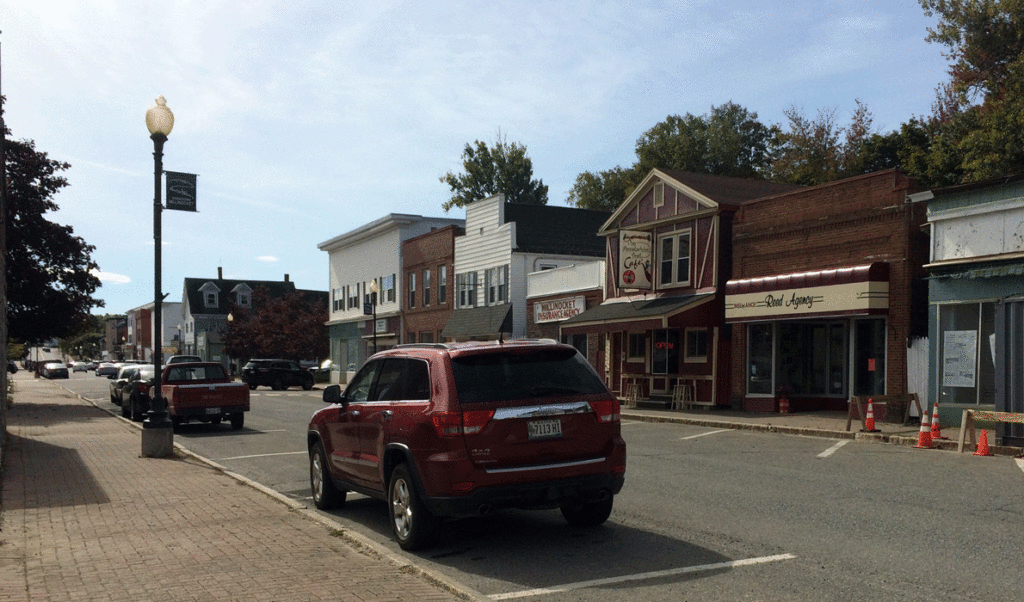Reflections is written by Island Fellows, recent college grads who do community service work on Maine islands and in remote coastal communities through the Island Institute, publisher of The Working Waterfront
“An Island Fellow? Well, then how did you end up here in Millinocket?” I hear this question less frequently now that I’ve been living and working in Millinocket for the last six months, but I’ve heard it plenty of times. Depending on the situation, my answer might start in one of a few ways:
“Ha-ha, I know, I know, but actually…”
“Well, there are a lot of lakes around here…”
“What?! Did I take a wrong turn somewhere? I knewthere weren’t enough lobster boats around here…”
I find this question, which usually comes from genuine curiosity, makes a good segue into talking about my specific fellowship project, volunteering in the Katahdin Region, the Island Institute, and my passion for community and economic development. The point I usually conclude with is that rural, isolated communities, whether they are surrounded by ocean, land, or forests, are facing shared challenges today and can learn a lot from each other.
I’ve experienced some of these commonalities first-hand. I was Isle au Haut’s Island Fellow from 2014 to 2016, working with one of Maine’s smallest island communities on planning, historical preservation, and creation of a municipal website. In some ways, Millinocket and Isle au Haut seem like they couldn’t be more different. On the one hand, you have Isle au Haut—year-round population of approximately 45; strong fishing heritage; and six miles into the Atlantic Ocean, but connected to the mainland through a 40-minute ride on the mail boat.
On the other hand, you have Millinocket: population around a hundred times larger than Isle au Haut at about 4,500; a quintessential mill town for almost a hundred years; and relatively close to a network of other small communities that make up the Katahdin Region.
Both are small, rural, communities with natural resource-based economies, but they can seem miles away from each other in geography and identity. Having worked with both communities, I can confidently say that beyond these superficial differences, the similarities between Isle au Haut and Millinocket run deep.
The natural resource-based economies of the past are adapting to new populations and diversified economic development opportunities, including tourism, recreation, and a proximity to park lands (the Katahdin Woods & Waters National Monument near Millinocket, and the portion of Acadia National Park on the island). The populations are working to find new ways to make a living from natural resources, and to find new ways to capitalize on collaborations within these close-knit communities.
Isle au Haut and Millinocket may be different, but they are tackling the same challenges of demographics, infrastructure, economics, and identity with the perseverance and creativity I have come to appreciate in my fellowships.
Most importantly, though, the common thread between my two fellowships has been the commitment of community members to work with me on sustainable projects that will create lasting change.
On Isle au Haut, this meant working with a committee to implement a comprehensive plan for the island’s future; in Millinocket, my work with the library’s dedicated volunteers—and planning for expanding volunteering in the region—puts me aboard a train of renewed energy and revitalization that is already pulling out of the station toward innovative developments.
In both cases, building community collaborations has been essential to success. In my work with these communities, I have been inspired by the hard work and optimism I find, despite challenging times and a changing future. The people who engage with this work are not just wishing for a better future; they are working toward it. It’s my privilege to be invited to take part in building that brighter tomorrow for islands (and “islands”) across the state.
Meghan Cooper works with the Millinocket Memorial Library developing a community resource and volunteer coordination center for the Katahdin region. She is finishing her graduate degree at of the University of Southern Maine in policy, planning, and management.





